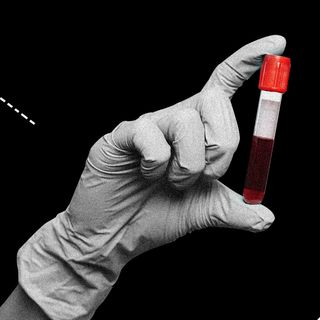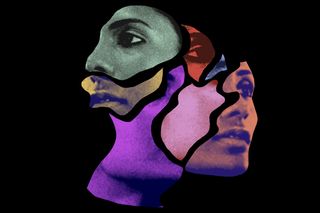
What Is Psychosis?
Psychosis is a condition that causes individuals to lose touch with reality, and see, hear, or believe things that aren’t real.

Psychosis is largely understood as an altered perception of reality. According to the US National Institute of Mental Health (NIMH), three out of 100 people experience psychosis at some point in their lives.
Yet, psychosis continues to be hugely stigmatized. A general lack of public awareness around mental health issues leads people to believe pop-culture misrepresentations of the condition — from the aggressive exaggeration of Jack Nicholson’s psychosis in The Shining to the unnecessary sexualization of Natalie Portman’s character in Black Swan. Released in 2019, a BBC documentary called Psychosis and Me also acknowledged this stigma around psychosis when Homeland actor David Harewood opened up about his experience with it.
What is psychosis?
According to NIMH, psychosis is a condition of the mind where the affected individual struggles to differentiate fantasy from reality. It is characterized by delusions (false beliefs or impressions) and hallucinations (sensory perceptions in the absence of any stimulus). An individual suffering from psychosis can see, hear, feel, or smell things that aren’t actually present — even though they experience those things as real.
“Hallucinations are confusing and disorientating, as you don’t know what’s real, and what isn’t, and you have a constant feeling of something following you. My recent one is thinking I have a cat — I don’t,” Hayley Smith, 31, told Huffington Post in an article about people’s experiences with psychosis. Psychosis can indeed induce aggressive and violent hallucinations for some. “I’ve been to a place where I wanted to just smash the house up and end my life with numerous objects because of auditory and visual hallucinations,” Thomas Dunning, 28, said, describing yet another instance when he had to stop driving, and pull his car over, because he believed he could see blood on his hands. And yet, for some others, psychosis presents as a more spiritual experience.
These periods when an individual loses contact with reality are known as psychotic episodes. A psychotic episode can be functionally disruptive for an individual, as it interferes with their ordinary, day-to-day activities. It can also cause cognitive impairments and emotional disturbances. Further, acting upon perceived realities can also put the individual suffering from a psychotic episode, as well as those around them, at risk.
Related on The Swaddle:
All You Need To Know About Maladaptive Daydreaming
What are the symptoms of psychosis?
According to the National Health Service in the UK, symptoms of psychosis include hallucinations and delusions, in addition to confused and disturbed thoughts, which could include rapid and constant speech, switching from from one topic to another mid-sentence, or a sudden loss in train of thought, evident through abrupt pauses in conversation or activity. NIMH also includes depression, anxiety, sleep problems, social withdrawal, lack of motivation, and difficulty in overall functioning in the list.
Experts also believe that potential precursors to psychotic episodes can include sudden mood swings, more trouble concentrating than usual, scattered thoughts, or a change in speed of thoughts, and a sudden overall change in how one perceives one’s environment. In addition, physical symptoms like sudden changes in sleeping or eating cycles, major fluctuations in energy levels, headaches, and stomachaches, could also indicate a potential psychotic episode.
“A person believing they are in danger may call the police. Someone who believes he is Jesus Christ may spend the day preaching in the streets. A person may stop eating because they are concerned that the food is poisoned, or have trouble sleeping because they are scared,” the Yale School of Medicine says, citing examples of manifestations of psychotic episodes in individuals.
But, it is important to note here that psychosis itself is also a symptom and is usually indicative of other underlying conditions.
What causes psychosis?
Causes of psychosis range from mental disorders, like schizophrenia or bipolar disorder, to stress, sleep deprivation, trauma, or bereavement over the loss of a loved one. Sometimes, rapid onset of psychosis follows the challenges of pregnancy and childbirth as well, with post-natal psychosis affecting one to two women in a 1000. Certain prescription drugs, alcohol abuse, as well as usage of psychedelic drugs could contribute to causing psychosis.
New research by Cambridge University scientists has concluded that problems in how the brain recognizes and processes new information can lie at the root of psychosis. The researchers found that faulty brain activation in the superior frontal cortexwhile processing new information could lead people to believe things that are not real. “Novelty and uncertainty signals in the brain are very important for learning and forming beliefs. When these signals are faulty, they can lead people to form mistaken beliefs, which in time can become delusions,” Dr. Graham Murray, from the Department of Psychiatry at Cambridge, said.
Related on The Swaddle:
SC Notice Asks Indian Insurance Regulatory Body Why There Is Still No Coverage for Mental Health
Can psychosis be treated?
While the treatment of psychosis often depends on the treatment of the underlying illness, ways to directly address and manage the symptom have been explored.
Research has found that Cognitive Behavioral Therapy (CBT), or a psycho-social intervention through talking, may act as a preventive measure against psychosis. Evidence suggests that it can prevent transitions into psychotic episodes for patients with schizophrenia, who are considered at high risk of psychosis. In less severe cases, people have also been treated using Acceptance and Commitment Therapy (ACT) — a form of therapy, which encourages individuals start the process of embracing their thoughts and feelings, rather than fighting, or feeling guilty about them.
Anti-psychotic pills, also used to treat schizophrenia and bipolar disorders, are often prescribed. Psychiatrists also advise people suffering from psychotic episodes to refrain from using alcohol and drugs, especially since cannabis usage has been linked to development of psychosis in users. Most experts seem to be in agreement about Coordinated Specialty Care (CSC) as an effective treatment for psychosis. CSC involves a coordinated approach, including medication, therapy, as well as support from family, friends, and colleagues, to address psychosis more holistically.
The Cambridge study, published last month in Molecular Psychiatry, also found that artificially altering dopamine-signaling to regulate function of brain activity that could aid an individual’s perception of reality, could be a potential treatment for psychosis.
Regardless of the method adopted, experts suggest that treatment of psychosis should begin as soon as an individual experiences the very first episode. “With early diagnosis and appropriate treatment, it is possible to recover from psychosis. Many people who receive early treatment never have another psychotic episode. The longer the symptoms go untreated, the greater the risk of additional problems,” NIMH advises.
Devrupa Rakshit is an Associate Editor at The Swaddle. She is a lawyer by education, a poet by accident, a painter by shaukh, and autistic by birth. You can find her on Instagram @devruparakshit.
Related


The Covid19 Pandemic Forces Us to Consider: Is the 5‑Second Rule for Dropped Food Still Valid?
